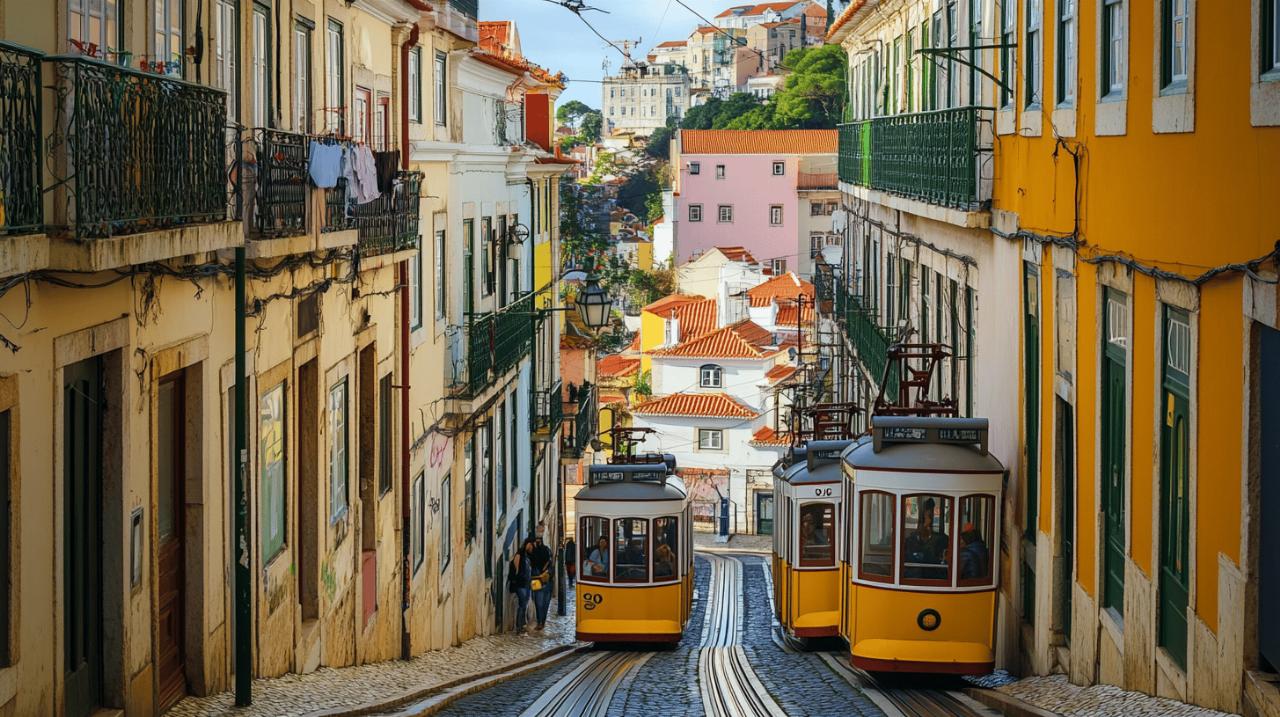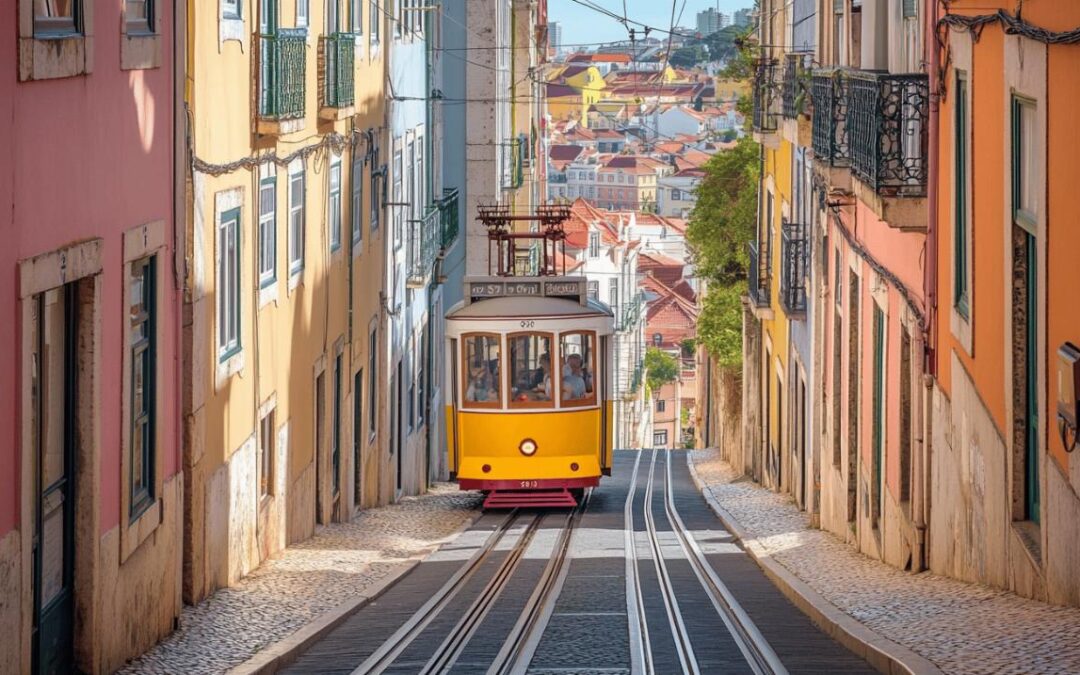Visiting Lisbon is more than just admiring its stunning architecture and indulging in delicious pastéis de nata—it's about connecting with the vibrant culture through language. Whether you're exploring the charming streets of Estrela da Bica or seeking your dream Portuguese home, having a few key phrases in your pocket can transform your experience from tourist to treasured guest.
Navigating Estrela da Bica Like a Local
Estrela da Bica, located in Lisbon's picturesque heart, offers visitors an authentic glimpse into Portuguese daily life. When wandering through this neighbourhood's narrow, winding streets, greeting locals with a confident “Olá” (hello) or “Bomdia” (good morning) can open doors to genuine interactions that typical tourists miss. Portuguese people deeply value warmth and cultural respect, and even the smallest effort with their language is greatly appreciated.
Essential Portuguese Greetings to Break the Ice
Starting conversations in European Portuguese shows respect and creates immediate goodwill. Begin with “Comoestá?” (How are you?) or the more casual “Tudobem?” (Everything good?). When meeting someone, respond with “Prazer” (Nice to meet you). As you part ways, a simple “Adeus” or the more informal “Tchau” (goodbye) leaves a positive impression. Remember that Portuguese is the official language in eight countries worldwide, but the European Portuguese spoken in Lisbon has distinctive pronunciation differences from Brazilian Portuguese.
Understanding neighbourhood directions in portuguese
Getting lost in Lisbon's labyrinthine streets is part of the adventure, but knowing how to ask for directions enhances your exploration. “Ondeestá…?” (Where is…?) is your essential question. For more specific navigation, learn “àesquerda” (left), “àdireita” (right), and “emfrente” (straight ahead). If someone's explanation becomes too complex, gently interject with “Eunãoentendo” (I don't understand) or “Falainglês?” (Do you speak English?). The locals around Estrela da Bica are generally helpful and patient with travellers attempting to speak their language.
Property terminology for your lisbon house hunt
If your Lisbon adventure includes property hunting, understanding real estate vocabulary becomes crucial. The Portuguese property market has unique terminology that differs from what you might be accustomed to in English-speaking countries. Learning these terms will help you communicate effectively with estate agents and property owners.
Decoding 'moradias' and 'casas' listings
When browsing property listings, you'll frequently encounter “moradias” and “casas.” While both translate roughly to “houses” in English, they have distinct meanings in Portuguese real estate. “Moradias” typically refers to detached or semi-detached houses, often with multiple floors and possibly a garden. “Casas,” meanwhile, is a more general term for homes, which might include apartments or flats. Listings might describe properties as “casatérrea” (single-storey house) or “moradiageminada” (semi-detached house). Understanding these nuances helps narrow your search to properties that match your expectations.
What to Ask About 'Quartos' and 'Banhos'
Once you've identified potential properties, you'll want to inquire about specific features. “Quartos” (bedrooms) and “banhos” (bathrooms) are fundamental considerations. You might ask “Quantosquartostem?” (How many bedrooms does it have?) or “Temcasadebanhoprivativa?” (Does it have an en-suite bathroom?). Other useful property-related phrases include “Quantocustaoaluguer?” (How much is the rent?) for rentals, or “Qualéopreçodevenda?” (What is the selling price?) for purchases. These questions help you gather essential information while demonstrating your seriousness as a potential buyer or tenant.
Dining and Shopping Phrases to Enhance Your Experience
Food and shopping are integral parts of Portuguese culture, and knowing relevant phrases elevates these experiences. From ordering in traditional establishments to haggling in local markets, the right words can transform your interactions and potentially save you money.
Ordering at Traditional Tascas and Cafés
Traditional tascas (taverns) and cafés offer authentic Portuguese cuisine at reasonable prices, particularly around Estrela da Bica. When ready to order, catch the server's attention with “Comlicença” (excuse me). Then proceed with “Eugostariadepedir” (I would like to order) followed by your selection. After enjoying your meal, express appreciation with “Estavadelicioso” (It was delicious). For coffee enthusiasts, knowing that “umcafé” refers to an espresso, not an American-style coffee, prevents confusion. And when the meal concludes, request the bill with “Aconta,porfavor” (The bill, please).
Bargaining phrases for local markets
Lisbon's markets offer everything from fresh produce to antiques, and bargaining is often expected at non-food stalls. Begin by asking “Quantocustaisso?” (How much does this cost?). If the price seems high, try responding with “Émuitocaro” (It's very expensive) or “Podefazerummelhorpreço?” (Can you make a better price?). The Portuguese saying “Quemnãoarrisca,nãopetisca” (Those who don't take risks, don't snack) applies perfectly to bargaining situations. Remember to maintain friendly relations throughout the negotiation, as building rapport often leads to better deals than aggressive haggling.
Cultural expressions that win local hearts
Beyond practical phrases, Portugal has a rich tradition of idiomatic expressions that offer insights into the culture. Using these expressions appropriately demonstrates a deeper appreciation for Portuguese language and culture.
Expressions of Appreciation for Portuguese Hospitality
Portuguese hospitality is legendary, and expressing gratitude appropriately strengthens connections. Beyond the basic “Obrigado” (thank you, used by men) or “Obrigada” (thank you, used by women), consider using “Muitoagradecido” (very grateful) for significant kindnesses. When someone wishes you well, respond with “Igualmente” (likewise). If you're invited into a Portuguese home, compliment it with “Quecasabonita” (What a beautiful home). The phrase “Àsfavor” (be so kind as to) can preface requests, adding a layer of politeness that Portuguese people value in social interactions.
Neighbourhood-specific slang and sayings
Each Lisbon neighbourhood has its unique character, reflected in local expressions. In Estrela da Bica, you might hear “EstreladaBica,muitobom!” (Estrela da Bica, very good!) expressing pride in the area. Throughout Portugal, sayings like “Águamoleempedradura,tantobateatéquefura” (Soft water on hard rock hits until it drills through) emphasise persistence. “Estarcomosazeites” (To be with the olive oils) means someone is irritated, while “Ficaravernavios” (To be left watching ships) describes missed opportunities. Using these expressions appropriately signals cultural awareness that goes beyond typical travel communication, making your Lisbon adventure truly memorable whether you're on a short Contiki trip or a longer Expat Explore journey.
Day-to-day communication strategies for longer stays
When spending more than just a holiday in Lisbon, having a grasp of practical Portuguese phrases becomes essential for truly settling in. While many locals speak English, making an effort with Portuguese creates meaningful connections and shows respect for the culture. For those staying weeks or months in Portugal's vibrant capital, these communication strategies will help you navigate daily life with greater ease and confidence.
Managing Transport and Daily Errands in Portuguese
Getting around Lisbon requires some specific vocabulary to navigate the city's transport system and handle everyday tasks. Start with transport essentials like “Ondeficaaparagemdeautocarro?” (Where is the bus stop?) or “Quantocustaumbilhetepara…?” (How much is a ticket to…?). When shopping, phrases such as “Quantocustaisso?” (How much does this cost?) and “Eugostariadecomprar…” (I would like to buy…) prove invaluable.
For daily errands, build your vocabulary around practical needs. At the pharmacy, “Precisodeummedicamentopara…” (I need medicine for…) can be crucial. Banking matters might require “Gostariadelevantardinheiro” (I would like to withdraw money). Remember that Portuguese people genuinely appreciate your efforts, even if your pronunciation isn't perfect. If you get stuck, simply say “Eunãoentendo” (I don't understand) or “Falainglês?” (Do you speak English?), and most Lisboetas will happily assist you.
Building relationships with neighbours through language
Creating bonds with neighbours transforms a stay from merely visiting to truly living in Lisbon. Begin with warm greetings like “Bomdia” (Good morning), “Boatarde” (Good afternoon), or “Boanoite” (Good evening) whenever you pass neighbours in your building or street. These simple acknowledgements open doors to further interaction.
Progress to casual conversations by asking “Comoestá?” or the more colloquial “Tudobem?” (How are you?). When invited to a neighbour's home, bring a small gift and say “Prazer” (Nice to meet you) to new acquaintances. Learn to express appreciation with “Estámuitobom!” (This is very good!) when served food or drink. Portuguese culture values warmth and family connections, so showing interest in local customs will be well-received. Over time, you might even master local sayings like “Quemnãoarrisca,nãopetisca” (Those who don't take risks, don't snack) – perfect for showing your growing cultural fluency while building genuine friendships that make Lisbon feel like home.

